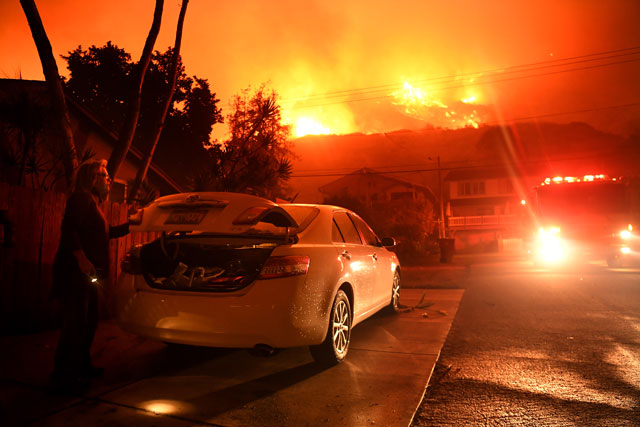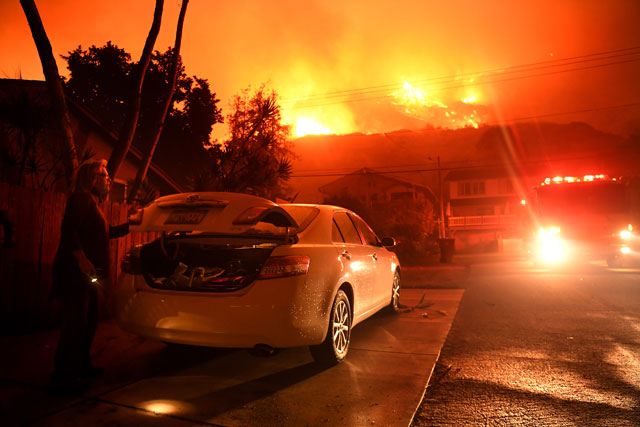
Support justice-driven, accurate and transparent news — make a quick donation to Truthout today!
 A resident packs her car as the Thomas Fire approaches the town of La Conchita early on December 7, 2017. A new study suggests that the planet is far likelier to become four degrees Celsius warmer by 2100 than previously thought. (Photo: Wally Skalij / Los Angeles Times via Getty Images)
A resident packs her car as the Thomas Fire approaches the town of La Conchita early on December 7, 2017. A new study suggests that the planet is far likelier to become four degrees Celsius warmer by 2100 than previously thought. (Photo: Wally Skalij / Los Angeles Times via Getty Images)
Climate change is occurring at a faster rate than has previously been predicted, according to a new study which suggests that the most extreme estimates of the effects of global warming are likelier than more optimistic predictions.
With the current level of greenhouse gas emissions remaining steady, researchers say, there is a 93 percent chance that the planet will be more than four degrees Celsius warmer than it is now by 2100. Earlier estimates held that there was about a 62 percent chance of this level of warming.
An earth that’s four degrees warmer than it is today would bring severe prolonged heat waves and would likely eliminate coral reefs and small islands as a result of sea levels rising.
The study, published in Nature and completed by Patrick Brown and Ken Caldeira at the Carnegie Institution for Science, suggests that the world’s “carbon budget” is smaller than has previously been thought and that carbon emissions must go down faster than previous studies have found.
The Paris Agreement on climate change, reached in 2015 by nearly 200 countries, holds that the governments must do their part to keep the earth from warming more than two degrees Celsius above pre-industrial levels—but according to Brown and Caldeira, the possibility that this goal is achievable is overly ambitious.
As Professor Mark Maslin, a climatologist at University College London, told the Independent in response to the study, “To achieve these targets the climate negotiations must ensure that the global emissions-cuts start as planned in 2020 and continue every single year thereafter.”
Brown and Caldeira examined climate change models that have been used to predict the future of the planet based on its atmospheric conditions and compared them with recent satellite images of the atmosphere. The models that gave the most accurate predictions tended to show more warming of the planet in the future compared to those with more optimistic estimates.
“The basic idea is that we have a range of projections on future warming that came from these climate models, and for scientific interest and political interest, we wanted to narrow this range,” said Brown. “We find that the models that do the best at simulating the recent past project more warming.”
The researchers say their findings challenge the objections climate change deniers have put forth regarding the climate models that are used to predict global warming. Some have argued that since not all of the models have the same predictions, the science of climate change is up for debate.
“This study undermines that logic,” Brown told the MIT Technology Review. “There are problems with climate models, but the ones that are most accurate are the ones that produce the most warming in the future.”
On social media, observers highlighted the urgency of the study and called for an end to right-wing denials of climate science.
Yup, climate science is biased – it has consistently underestimated the risks. Time to wake up people! #climatechange https://t.co/8Esf3tCrb7
— Eric Beinhocker (@EricBeinhocker) December 7, 2017
Oh dear, 93% chance that global warming will exceed 4C by end of century! We need to act fast rather than just continuing ignoring it. #ClimateChange #GlobalWarming https://t.co/7j111JAFxP
— Laurie Ison (@Laurie_Ison) December 7, 2017
Every time scientists re-evaluate #globalwarming, things are worse than their previous worst case scenarios. https://t.co/KPXWHK1wID Yet #Trump wants to help out one of his donors by allowing him to restart his old outdated coal-powered power plants.
— TruthBwana (@TruthBwana) December 7, 2017
Trump is silencing political dissent. We appeal for your support.
Progressive nonprofits are the latest target caught in Trump’s crosshairs. With the aim of eliminating political opposition, Trump and his sycophants are working to curb government funding, constrain private foundations, and even cut tax-exempt status from organizations he dislikes.
We’re concerned, because Truthout is not immune to such bad-faith attacks.
We can only resist Trump’s attacks by cultivating a strong base of support. The right-wing mediasphere is funded comfortably by billionaire owners and venture capitalist philanthropists. At Truthout, we have you.
Truthout has launched a fundraiser, and we must raise $31,000 in the next 4 days. Please take a meaningful action in the fight against authoritarianism: make a one-time or monthly donation to Truthout. If you have the means, please dig deep.